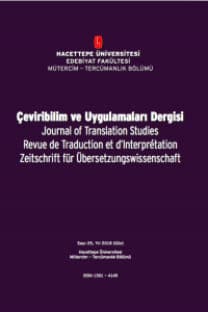Kültür Çevirisi Kavramına Felsefi bir Yaklaşım
kültür çevirisi, Felsefe, Antropoloji, okuma, kitap kulüpleri
A Philosophical Take on Cultural Translation
cultural translation, philosophy, anthropology, reading, book clubs,
___
- Adam, B. (1994). Perceptions of time. T. Ingold (Ed.), Companion encyclopedia of anthropology: Humanity, culture and social life içinde (ss. 503-526). Routledge.
- Apter, E. (2011, 22 Şubat). Against world literature: The right to untranslatability in comparative literature. [konuşma]. Lizbon Üniversitesi, Portekiz.
- Asad, T. (2014). Britanya sosyal antropolojisinde kültürel tercüme kavramı. Dinin soykütükleri: Hıristiyanlıkta ve İslamda iktidarın nedenleri ve disiplin (Çev. Ayet Aram Tekin) içinde (ss. 193–224). Metis.
- Bachmann-Medick, D. (2006). Meanings of translation in cultural anthropology (Çev. Kate Sturge). T. Hermans (Ed.), Translating Others (Cilt 1) içinde (ss. 33-42). St Jerome.
- Bachmann-Medick, D. (2016). Cultural turns: New orientations in the study of cultures (Çev. Adam Blauhut). De Gruyter.
- Bassnett, S. (1998). The translation turn in cultural studies. S. Bassnett & A. Lefevere (Ed.), Constructing cultures: Essays on literary translation içinde (ss. 123-140). Multilingual Matters.
- Bhabha, H. (1994/2004). The location of culture. Routledge.
- Buden, B., Nowotny, S., Simon, S., Bery, A., & Cronin, M. (2009). Cultural translation: An introduction to the problem, and responses. Translation Studies, 2(2), 196-219. https://doi.org/10.1080/14781700902937730
- Brandon, William P. (1982). “Fact” and “Value” in the thought of Peter Winch: Linguistic analysis broaches metaphysical questions. Political Theory, 10(2), 215-44. https://doi.org/10.1177/0090591782010002004
- Conway, K. (2012). A conceptual and empirical approach to cultural translation. Translation Studies 5(3), 264-279, https://doi.org/10.1080/14781700.2012.701938
- Conway, K. (2016). Kültür çevirisi (Çev. P. S. İskurt & D. Tekgül). Y. Gambier & L. van Doorslaer (Ed.), Handbook of translation studies online içinde. https://benjamins.com/online/hts/articles/cul2.tr
- Evans-Pritchard, E.E. (1937/1976). Witchcraft, oracles and magic among the Azande. Clarendon Press.
- Evans-Pritchard, E.E. (1940/1969). The Nuer. Oxford University Press.
- Gramling, D. (2019). The affront of untranslatability: Ten Scenarios. D. Large, M. Akashi, W. Józwikowska & E. Rose (Ed.) Untranslatability: Interdisciplinary perspectives içinde (ss. 80-96). Routledge.
- Hall, S. (1991) The local and the global: Globalization and ethnicity. A. D. King (Ed.) Culture, globalization and the world system içinde (ss. 19-40). MacMillan.
- Leal, A. (2019). Equivalence. P. Rawling & P. Wilson (Ed.), The Routledge handbook of translation and philosophy içinde (ss. 224-242). Routledge.
- Malmkjær, K. (2019). On the (im)possibility of untranslatability. D. Large, M. Akashi, W. Józwikowska & E. Rose (Ed.) Untranslatabilty: Interdisciplinary perspectives içinde (ss. 41-49) Routledge.
- Mounce, H.O. (1973). Understanding a primitive society. Philosophy, 48, 347-62. http://www.jstor.org/stable/3749687
- Pleasants, N. (2000). Winch and Wittgenstein on understanding ourselves critically: Descriptive not metaphysical. Inquiry, 43, 289-318. https://doi.org/10.1080/002017400414872
- Pratt, M. L. (1992/2008). Imperial eyes: Travel writing and transculturation (2. Baskı). Routledge.
- Schleiermacher, F. (1838/1977). On the different methods of translating. A. Lefevere (Çev. ve Ed.) Translating literature: The German tradition from Luther to Rosenzweig içinde (ss. 67-89). Van Gorcum.
- Sturge, K. (2007). Representing others: Translation, ethnography and the museum. St. Jerome.
- Tekgül, D. (2012). Around the World in English: The Production and Consumption of Translated Fiction in the UK between Cosmopolitanism and Orientalism. [Yayımlanmamış doktora tezi]. Exeter Üniversitesi İnsan ve Toplum Bilimleri Fakültesi. https://ore.exeter.ac.uk/repository/bitstream/handle/10871/9701/TekgulPD_TPC.pdf?sequence=3
- Tekgül, D. (2019). Book clubs as micro-public spheres: Translated literature and cosmopolitanism. Language and Intercultural Communication, 19(5), 380–392, https://doi.org/10.1080/14708477.2019.1581794
- Trivedi, H. (2007). Translating culture vs. cultural translation. P. St-Pierre & P. C. Kar (Ed.), In Translation – reflections, refractions, transformations içinde (ss. 277-287). John Benjamins.
- Tymoczko, M. (2019). Translation theory and philosophy. P. Rawling & P. Wilson (Ed.), The Routledge handbook of translation and philosophy içinde (ss. 173-194). Routledge.
- Winch, P. (1964). Understanding a primitive society. American Philosophical Quarterly, 1(4): 307-23. https://www.jstor.org/stable/20009143
- Winch, P. (1958/1990). The Idea of a social science and its relation to philosophy. Routledge.
- Winch, P. (1997). Can we understand ourselves? Philosophical Investigations 20(3), 193-204. https://doi.org/10.1111/1467-9205.00038
- Venuti, L. (1995/2008). The translator’s invisibility: A history of translation (2. Baskı). Routledge.
- Yayın Aralığı: Yılda 2 Sayı
- Başlangıç: 1991
- Yayıncı: Hacettepe Üniversitesi
Çeviride Kuramdan Uygulamaya, Kuramdan İncelemeye: Disgrace Romanının Bir İncelemesi
Uluslararası Sağlık Örgütlerinin Türkçeye Çevirisinin ve Kısaltmalarının İncelenmesi
İlhami SIĞIRCI, Simge YENİOĞLU
Sayfadan Sahneye, Dilden Çok-modluluğa: Edebi Metinlerden Sahne Uyarlamaları
Kültür Çevirisi Kavramına Felsefi bir Yaklaşım
İkilik Dışı Cinsel Kimliklerin Görsel-İşitsel Çeviride Yansıtımına İlişkin Sorun Odaklı Bir Yaklaşım
F. Schleiermacher’in Diyalektik Yaklaşımının Çeviri Yaklaşımına Etkisi
‘Kaplan Gözü Maceraları’ Çeviri Çocuk Kitaplarında Çevirmen Kararları
Uzaktan Sözlü Çeviride (USÇ) Ergonomi: Zoom Kullanımına Çevirmen Bakış Açısı
